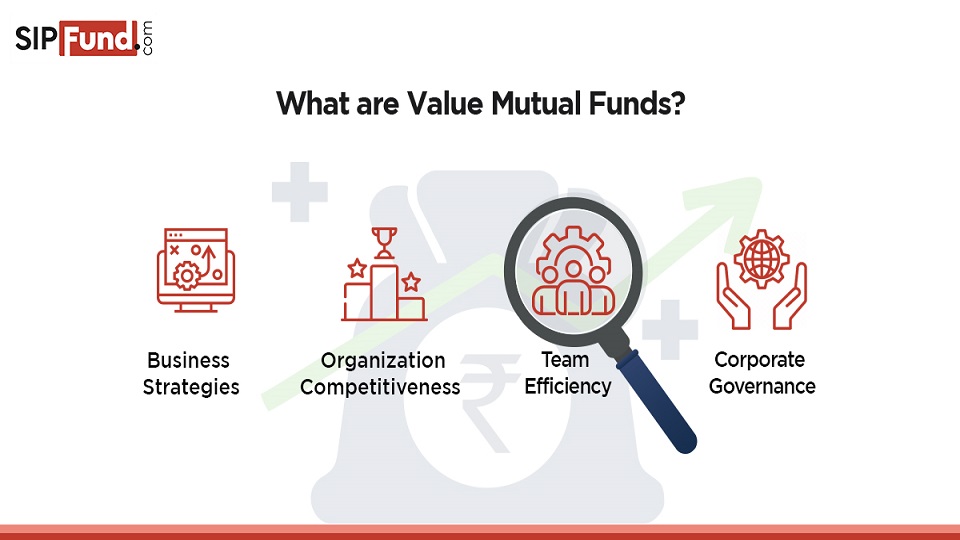
What are value funds in mutual funds?
Introduction
The last quarter of 2020 ended on a positive note for mutual funds as mutual funds saw their asset base increased to 29.71 lakh crore. If we look at July-September quarter, then average assets under management were 27.6 lakh crore. Therefore, asset base has increased by 7.6 percent. Association of mutual Funds in India has presented this data and cited the rally in equity oriented mutual funds as the main reason for this surge. Mutual funds are attracting lot of investments across varying asset classes and sub classes and there is another type of mutual fund investing which is making a headway in markets after experiencing an ailing phase in early January 2020. This new category which is talked about in financial circles is ‘Value investing’. Fund managers adopt different types of investing based on their goals and strategies. There are mainly three types of investing; Growth, Contrarian and Value investing. In this article, we will try to understand the nitty gritty of Value investing. If you want to know about Contrarian investing then please feel free to click on the link: https://sipfund.com/blog/Contra-Mutual-Funds.html
What are Value funds?
A fund manager who has adopted value investing strategy will search for stocks which are traded less than their intrinsic values. Value funds are nothing but the stocks which have value but are being traded at lower prices due to certain inefficiencies. Value funds have the potential to generate higher returns if chosen carefully. Intrinsic value of a company can be ascertained by looking at the fundamentals, business strategies, competitiveness, efficiency of management team, corporate governance etc. There may be times when share prices do not indicate the true worth of a company and shares are traded at lower prices than their intrinsic value and in those times the stocks are said to have some ‘value’. Hence, Value fund belongs to equity class of mutual funds which focuses on the principle of value investing.
Are Value funds for all?
Investors who would like to invest in value funds should have patience, long time horizon, risk tolerability and a rigorous research about the prospective stocks. Value investing does not suit all investors because preferences and financial goals are different. Investors should have long investment horizon since those stocks that are currently underperforming but may give exceptionally higher returns in future provided investors have patience to wait and reap the benefits. It is a tough task for fund managers to choose the right stock at right time since picking up an undervalued stock requires lot of research and analysis hence fund manager’s past performance should be considered before putting your hard-earned money in value funds. Value funds could fall in same category as small and mid-cap funds in terms of risk profile. Since future is uncertain so is the possibility that value funds necessarily perform better in future, hence investors should have the capability and willingness to undergo some amount of risk.
Why are Value funds in news?
Investors are happy to see value funds performing after a long dud. The value funds have provided approximately 14% returns in last year and interestingly 17% returns in just last 3 months. The value funds outperformed NSE 500 Total Return Index (TRI) on 1-month return though by a small margin. Most of the value-oriented funds have delivered returns between the range of 32% and 52% in last one year. Experts believe that this trend may follow in the year 2021 provided fund managers are cautious of downside risks. Mutual fund analysts are of the opinion that low interest rates, mortgage rates and cost control measures by corporates are some of the factors that could drive up the value funds since these factors will make the fund house optimistic.
Given below are some of the top performing Value Funds:
| FUND SCHEMES NAME | 1 Year Return | 3 Year Return | 5 Year Return |
|---|---|---|---|
| UTI Value Opportunities Fund | 35% | 36% | 48% |
| ICICI Prudential Value Discovery Fund | 35% | 33% | 40% |
| Tata Equity PE Fund | 30% | 25% | 38% |
| HDFC Capital Builder Value Fund | 34% | 24% | 34% |
| IDFC Sterling Value Fund | 41% | 24% | 32% |
Cautious Points
Value funds being the sub class of equity oriented mutual funds are cyclical in nature. Investors should not get panic due to knee jerk reactions in the markets. Investors are advised to stay with these funds for long time say at least for 7 years since correction will happen sooner or later. Historically, it has been observed that whenever there is an upward movement in the markets value stocks perform better than the rest of categories. Secondly, investors should know the underlying strategy of the fund house i.e. how much a fund is investing in value fund; what type of combination of contra and value bets are being adopted by the fund. Lastly, SEBI has not made clear rules for value funds which create a scope of subjectivity in the concept of value investing. Investors are advised to research thoroughly about the practice of value investing by the respective fund.
Conclusion
Once the fund managers have found the dominant companies to invest then half work is already done since these companies are already trying their best to grow. Their growth in future is directly related to higher returns for value schemes. In recent time most of IT stocks are undervalued but given their consistent growth, they are expected to generate higher returns once economy settles. Value funds are not that scary if investors can give them some time to perform. Patience is the key to make value funds more valuable for your portfolio. Value funds are considered as no bias funds because they do not follow herd mentality which can work in investors favor in times of market shocks
Happy investing!

